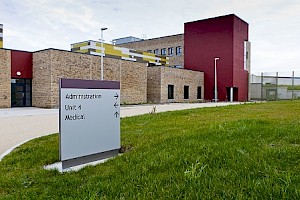Youth Justice
Ireland has a long history of poor responses to offending behaviour by children. A core strand to IPRT's work since its establishment in 1994 has been the promotion of a more effective youth justice system, with emphasis on non-custodial alternatives, diversion, early intervention and prevention strategies and programmes. Central to our work was ending the practice of detaining children in adult prisons, which was in breach of international human rights standards and a serious stain on Ireland's human rights record.
International human rights standards, and in particular the provisions of the UN Convention on the Rights of the Child, are clear that custody for children should only be used as a last resort and for the minimum required period of time. All efforts should be made to apply alternatives to detention to ensure that such a measure is only used in exceptional circumstances.
In Ireland, the Children Act 2001 recognizes the principle of detention as a last resort. The Act prohibits the imprisonment of children and the Criminal Justice Act 2006 makes provision for all children less than 18 years of age to be detained in Children Detention Schools. The detention school model is focused on a model of care, education, health and programmes that address offending, with improved outcomes for the young people, their communities and all of society. The Irish Youth Justice Service is responsible for the Children Detention Schools, within the Department of Children and Youth Affairs.
Following years of sustained advocacy by IPRT, along with many national and international bodies, in 2012 the detention of boys aged under 17 at St Patrick's Institution ended. In March 2017, a Ministerial Order ended the sentencing of children aged under 18 to adult prison in Ireland, and in April 2017, St. Patrick’s Institution was finally closed. Since September 2017 boys aged under 18 are no longer detained in the adult prison system.
IPRT continues to work towards progressive change in youth justice policies and practice, as well as engaging with wider policy and practice issues relating to youth justice, such as the provision of alternatives to detention, diversion and early intervention programmes.

Youth homelessness and imprisonment
3rd March 2011
Youth homelessness can be traced back to problems experienced in childhood, and a lack of aftercare increases chances of ending up in prison in adulthood, a conference on youth homelessness held by Focus Ireland has found.
UK: Specialist Drug and Alcohol Treatment for Young People - A Cost Benefit Analysis
24th February 2011
The Department for Education in the UK have published a report into the possible benefits of treating young people for substance misuse.
Young People in St.Patrick's Institution
9th February 2011
A new report published by the Ombudsman for Children on the experiences of children and young people was published today.The report recommends that the facility be closed as a detention facility for children.
(Glasgow) Prevention and intervention programmes see 'significant fall' in violent youth crime
3rd February 2011
The significant fall in the number of serious violent crimes committed by young people in Glasgow is being attributed to a range of prevention and intervention programmes.
US: Children on the Outside
12th January 2011
Children on the Outside: Voicing the Pain and Human Costs of Parental Incarceration is a new report from Justice Strategies detailing the impacts of parental imprisonment on children.
Time for a new hearing
5th January 2011
A new report published today proposes that the current youth justice system in England and Wales should be extensively modified to allow for a far greater presence of restorative youth conferencing into the system.
Diversion of youth offenders in Hull
22nd December 2010
In Hull and the surrounding areas youth offenders are avoiding what some would claim to be direct punishment, and instead are being offered support or referred to youth clubs and other organisations, in an effort to address youth re-offending.
Irish Times: U.S. juvenile justice programme has valuable lessons for Ireland
20th December 2010
In today's Irish Times, Marsha Levick and Ursula Kilkelly write on how strategic litigation combined with academic research has helped advance the rights of children.
Enhancing child services, long term financial implications
16th December 2010
In these economically challenging times it is exceptionally difficult to make commitments to spare any specific services from budget cuts. It takes political courage and an ability to see long term potential savings rather than simply immediate financial implications.
The Youth Justice System in England and Wales: Reducing Offending by Young People
10th December 2010
The National Audit Office in England and Wales has released a report detailing the recent improvements to the youth justice system which have contributed to reductions in recorded youth crime. However, offenders receiving more serious sentences remain as likely to reoffend.




